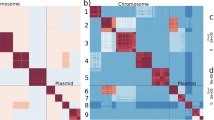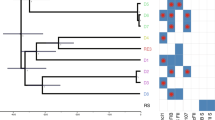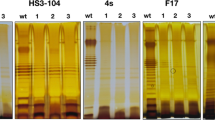Abstract
RECENTLY, I. Ørskov, F. Ørskov, W. J. Sojka and J. M. Leach1 described a new genetical donor strain of Escherichia coli. This strain, G7 (O8 : K87(B) : K88ab(L) : H19), was at first isolated from a case of pig enteritis. Investigations in different countries have shown that this serotype is frequently found in enteric diseases in pigs. A characteristic feature was the simultaneous existence of two K antigens in the same strain. The K87(B) antigen is a polysaccharide as are all hitherto examined B (and A) antigens2. The K88 antigen is thermolabile, that is, its ability to agglutinate and to bind antibody and its capacity to induce antibody formation in rabbits are destroyed by heating to 100° C for 1 h and thus it must be grouped as an L antigen according to established definitions3. Since the first detection of the K88 antigen it has been found in many E. coli strains, mainly from young pigs with intestinal diseases, and in different serological combinations4–6. Furthermore, it has been shown that K88 exists in at least two varieties, one of which is symbolized as K88ab, and the other K88ac (ref. 4). Strain G7 is a genetical donor and can, in conjugation experiments, transfer chromosomal markers to suitable recipients. In addition the genetic determinant of the K88 antigen can be passed to other E. coli serotypes by episomal transfer7.
This is a preview of subscription content, access via your institution
Access options
Subscribe to this journal
Receive 51 print issues and online access
$199.00 per year
only $3.90 per issue
Buy this article
- Purchase on Springer Link
- Instant access to full article PDF
Prices may be subject to local taxes which are calculated during checkout
Similar content being viewed by others
References
Ørskov, I., Ørskov, F., Sojka, W. J., and Leach, J. M., Acta Path. Microbiol. Scand., 53, 404 (1961).
Ørskov, I., Ørskov, F., Jann, B., and Jann, K., Nature, 200, 144 (1963).
Kauffmann, F., Enterobacteriaceae, Second edit. (Munksgaard, Copenhagen, 1954).
Ørskov, I., Ørskov, F., Sojka, W. J., and Wittig, W., Acta Path. Microbiol. Scand., 62, 439 (1964).
Wittig, W., Arch. Exp. Veterinärmed., 19, 657 (1965).
Sojka, W. J., Escherichia coli in Animals (Commonwealth Agricultural Bureau, Farnham Royal, Bucks, 1965).
Ørskov, I., and Ørskov, F., J. Bact. (in the press).
Grabar, P., and Burtin, P., Analyse Immuno-électrophorétique (Masson et Cie, Paris, 1960).
These enzyme preparations were gifts from Novo Industri A/S, Copenhagen.
Nomoto, M., and Narahashi, Y., J. Biochem. (Japan), 46, 1645 (1959).
Kabat, E. A., and Mayer, M. M., Experimental Immunochemistry (Charles C. Thomas, Springfield, Ill., 1961).
Author information
Authors and Affiliations
Rights and permissions
About this article
Cite this article
STIRM, S., ØRSKOV, I. & ØRSKOV, F. K88, an Episome-determined Protein Antigen of Escherichia coli. Nature 209, 507–508 (1966). https://doi.org/10.1038/209507a0
Issue Date:
DOI: https://doi.org/10.1038/209507a0
This article is cited by
Comments
By submitting a comment you agree to abide by our Terms and Community Guidelines. If you find something abusive or that does not comply with our terms or guidelines please flag it as inappropriate.



